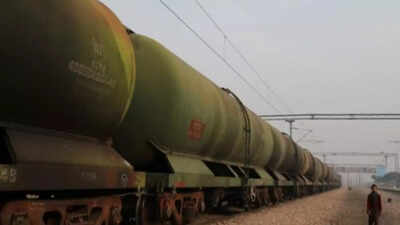
New Delhi: International Energy Agency (IEA) member countries, including India, late on Tuesday agreed to release 60 million barrels of oil from their emergency reserves in a message to global oil markets that there will be no shortage of supplies. Consequences of the conflict between Ukraine and Russia.
The decision was taken at this year’s IEA ministerial meeting, a ministerial-level extraordinary meeting of the 31-member governing board chaired by US Secretary of Energy Jennifer Granholm.
IEA members have emergency reserves of 1.5 billion barrels. 60 million barrels is 4% of those reserves. This equates to 2 million barrels per day for 30 days against a daily global supply of about 100 million barrels before the pandemic.
The coordinated fall is the fourth in the history of the IEA, created in 1974. The last collective action was taken in 2011, 2005 and 1991.
India consumes 4.5 million barrels of crude oil per day and has reserves of 39 million barrels or roughly 8-9 days’ supply spread across three locations.
India in November agreed to release 5 million barrels from its reserves as part of a US-led initiative for a coordinated release by major oil consumers such as China, Japan and South Korea to cool prices as oil prices rise. had crossed the $80 per barrel mark. , This was the first time India had tapped its emergency reserves for market intervention.
India, which meets 85% of its oil needs through imports, on Saturday pledged to support another US bid for a coordinated release of strategic reserves to calm the market, as prices stood at $105 per cent. barrels, the highest since 2014. Fuel price shock and hurt economic revival.
The statement came after US President Joe Biden said he would do everything in his power to “limit the pain the American people are feeling at the gas pump”.
In a sign that widespread sanctions against Russia’s energy supply are unlikely, the IEA meeting agreed that energy supplies should not be used as an instrument of political coercion nor a threat to national and international security. Should be.
The IEA Secretariat will continue to closely monitor global oil and gas markets and provide recommendations to the Governing Board, including potential additional emergency oil stock draws, the IEA said in a statement.
The Russia-Ukraine conflict coincides with a tight global oil market, heightened price volatility, commercial inventories that are at their lowest level since 2014, and limited ability of producers to provide additional supplies in the short term.
An IEA statement quoted IEA Executive Director Fatih Birol as saying, “The situation in energy markets is very serious and demands our full attention. Global energy security is at risk, leaving the world economy at a critical stage of recovery.” have been put at risk during
Russia is the world’s third largest oil producer and largest exporter. Its approximately 5 million barrels per day crude oil exports represent about 12% of global trade – and its approximately 2.8 million barrels per day petroleum products represent about 15% of global refined products trade. About 60% of Russia’s oil exports go to Europe and the other 20% to China.
FacebookTwitterLinkedinE-mail